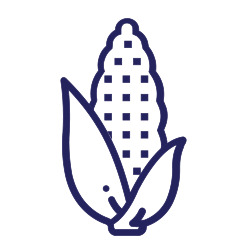The Manitoba Corn Initiative: Corn in crop rotation
Crop Types
- Corn
Collaborating Locations
University of ManitobaBackground
In Manitoba, corn is being grown in rotation with canola, spring wheat, soybeans, corn, and other crops. This range of crops is different and often more diverse than in other corn growing regions of Ontario and the US. In order to maximize the known benefits of crop rotation, it is important to evaluate which preceding crops (wheat, canola, soybean, corn) can provide benefit or penalty to subsequent corn crops. Of particular interest is the impact of growing canola prior to corn. Canola is a non-mycorrhizal plant, and this may have potentially negative impacts on corn, which is highly associated with mycorrhizae.
In spite of similar spring soil test Olsen P levels in all preceding crop treatments, early vegetative growth (V6) of the corn test crop was affected in all the three years. Corn plants after canola were shorter and had the lowest biomass and P uptake at V6 stage compared to all other treatments in all three years of the study. Similarly, AMF colonization of corn roots was lowest after canola at the V6 stage in two of the three years. In contrast, V6 corn plants were taller and had the highest biomass and P uptake following soybean in 2015 and following corn and soybean in 2016 and 2017. Despite these early season differences, there was no reduction in corn grain yield following canola in any year of the study.
Objectives
This project is a part of the larger Manitoba Corn Initiative - Corn Agronomy, fertility and agrometeorology. Overall objectives for the program include:
- Identify the best crops to grow prior to corn in a rotation
- Evaluate fertilization strategies for corn grown after canola
- Conduct an economic analysis of optimal crop rotations involving corn
- Identify optimum corn residue management strategies
- Evaluate fertilization strategies for alternative tillage systems for corn production
- Evaluate the corn heat unit system for Manitoba
Key Takeaways
- Growing host mycorrhizal crops in rotation increased corn growth and promoted early colonization of mycorrhiza on corn roots
- Presence of non-host in cropping systems decreased biomass and P uptake
- Corn dry down was delayed when corn followed canola compared to wheat
- No difference in corn yields following preceding crop even though early difference in corn growth.








